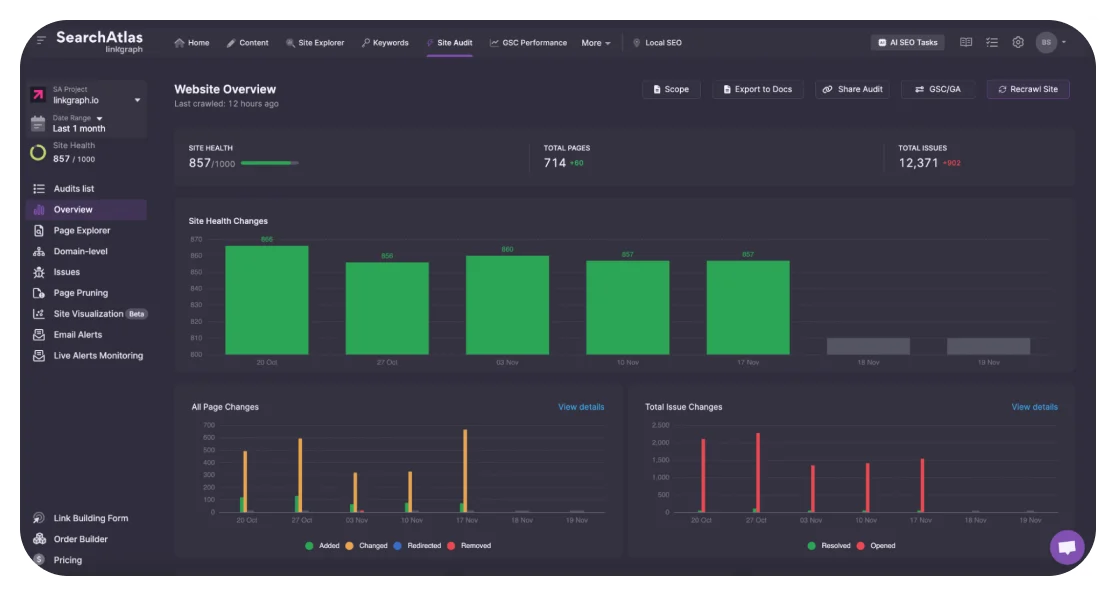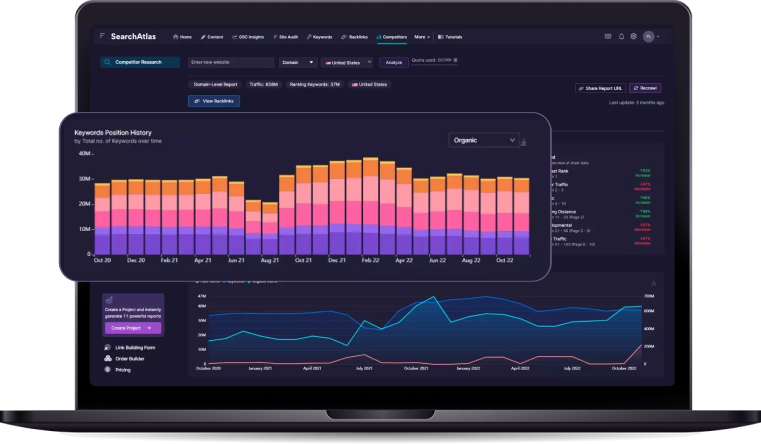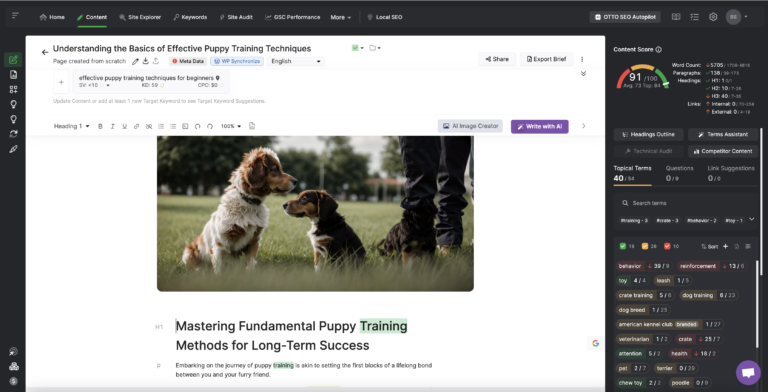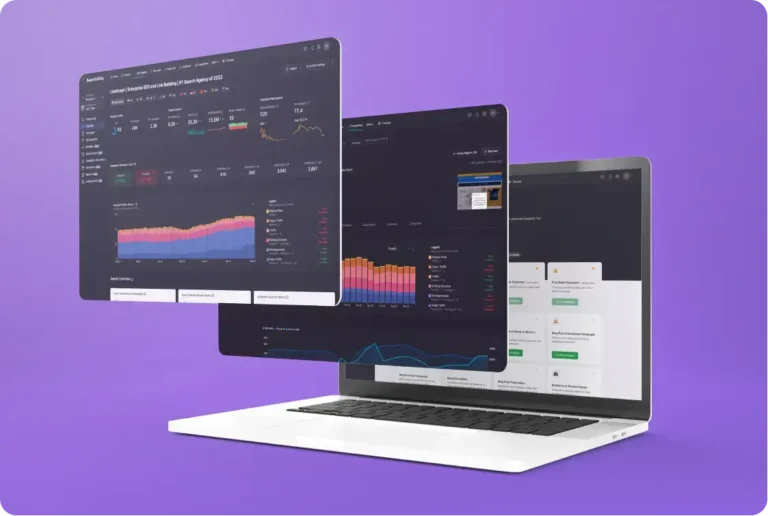Understanding Keywords: Definition and Role in SEO Strategies
In the dynamic realm of digital marketing, keywords serve as the cornerstone of effective SEO strategies, acting as a compass guiding users to relevant content.
Understanding what is a keyword is pivotal for businesses aiming to enhance online visibility and engage their target audience.
By breaking down the characteristics and functions of various keyword types, companies can tailor their content strategy to answer the questions posed by a curious searcher or to provide solutions to a specific problem.
This mastery over keyword research and utilization ensures that every blog post, title, and piece of copy resonates with both search engines and potential customers.
Keep reading to unearth the secrets of deploying keywords for bolstering search rankings and driving conversions.
Key Takeaways
- Keywords Are Integral to SEO Strategies and User Search Intent Alignment
- Various Keyword Types, Including Head Terms and Long-Tail Keywords, Play Distinct Roles in SEO
- Search Atlas Provides Data on Keyword Search Volume and Competition to Aid in Content Planning
- Strategic Placement of Keywords in Content and Metadata Is Crucial for SERP Visibility
- Continuous Monitoring and Analysis of Keyword Performance Are Essential for SEO Success
Exploring the Basic Concept of Keywords in SEO

In the digital terrain of search engine optimization, keywords act as the foundational elements, guiding users to relevant content and assisting businesses in aligning with their audience’s search queries.
The term ‘keyword’ relates to the specific terms and phrases that searchers input into search engines to locate information, products, or services.
These vital components of SEO enable digital marketers to craft strategies that amplify a website’s visibility and position it prominently in search engine results pages (SERPs).
Understanding the intricacies of keywords, from keyword ideas to target keyword selection, is instrumental for businesses to not only tune into their customer’s needs but also to communicate effectively with search algorithms that prioritize valuable and pertinent content.
Defining What Keywords Are and Their Importance
In the realm of digital marketing, the concept of a ‘keyword’ refers to the specific word or phrase that encapsulates the essence of a user’s search intent. It is the point of convergence where user needs and company offerings intersect, aided by the strategic placement of such terms in the textual landscape of a website.
Significant for both the searcher and the company, keywords help navigate the vast online space, directing the searcher towards the most relevant results, while simultaneously allowing companies to optimize their online footprint. The choice and application of these terms influence visibility, user engagement, and ultimately, conversion.
| Keyword Factor | Role in SEO Strategies |
|---|---|
| Searcher Intent | Aligns content with user queries |
| Relevance | Enhances visibility in SERPs |
| Conversion | Drives targeted user actions |
How Search Engines Utilize Keywords for Ranking
Within the intricate mechanics of search engines, keywords serve as signposts, guiding the indexing and ranking process. Search engines like Google deploy sophisticated algorithms to evaluate keywords against myriad factors, including their placement in titles, headers, and meta tags, to assess a page’s relevance to a particular search query.
The strategic use of keyword phrases can elevate a web page’s prominence on the digital scoreboard of SERPs. By prioritizing content that resonates with searchers’ intent and aligns with effective keyword distribution, search engines facilitate a symbiotic relationship between websites and their prospective audience.
| SEO Element | Function in Keyword Ranking |
|---|---|
| Title Tags | Signal key subjects to search engines |
| Content Relevance | Matches content with searcher queries |
| Keyword Density | Balances frequency without overstuffing |
Breaking Down Different Types of SEO Keywords

As professionals delve deeper into the multifaceted world of SEO, a nuanced understanding of the various types of keywords becomes essential.
Keywords span a broad spectrum, from concise, broad head terms to the specific, often more targeted long-tail keywords.
Each category serves a unique purpose, catering to different stages of the buyer’s journey.
Moreover, the distinction between branded and non-branded keywords adds complexity to SEO endeavors, with each type offering distinct advantages in aligning content with both broad audience interests and narrow market segments.
Mastering the subtle dynamics between these different keyword types is pivotal for any SEO strategy aimed at enhancing online visibility and audience engagement.
Unveiling the Varieties From Head Terms to Long-Tail
Exploring the spectrum of keyword types, head terms—often broad and general—serve as the entry point for many SEO strategies. These one or two-word phrases typically boast high search volumes but face fierce competition, making them a challenging yet vital aspect of content planning.
Conversely, long-tail keywords present a more refined approach, characterized by their specificity and length, usually extending beyond three words. Tailored to match more detailed search inquiries, long-tail keywords offer a clear pathway to increased relevance, catering to niche audience segments and fostering improved conversion rates.
Recognizing the Value of Branded vs. Non-Branded Keywords
The distinction between branded and non-branded keywords represents a strategic fork in the road for SEO professionals. Branded keywords incorporate a company’s name or specific product, harnessing existing brand recognition to drive traffic, while non-branded keywords tap into broader search terms that do not include brand names and capture potential customers earlier in the buying process.
A well-balanced SEO strategy skillfully blends both types of keywords to create a comprehensive approach: branded keywords leverage brand loyalty and conversion potential; non-branded keywords widen the top of the funnel, attracting new visitors who may be unfamiliar with the brand:
- Branded keywords build upon existing brand equity and customer loyalty to increase direct visits and conversions.
- Non-branded keywords expand reach, targeting users in the discovery phase and driving brand awareness.
Crafting Effective Keyword Strategies for SEO Success

In the vast expanse of search engine optimization, the art of sculpting an effective keyword strategy is both an indispensable skill and a ceaseless pursuit for digital marketers.
Beyond the mere selection of terms, successful SEO depends on meticulous research and the astute analysis of each word’s potential impact.
To secure a coveted spot in the search engine results, professionals embark on an exploration of keywords that involves rigorous investigation, evaluating the delicate balance between a keyword’s relevance, its search volume, and the competitive landscape it resides in.
This preparatory stage sets the stage for the subsequent tactical execution of SEO campaigns that resonate with both the search engines and the intended audience.
Steps to Conducting Thorough Keyword Research
Embarking upon thorough keyword research necessitates a strategic approach, beginning with defining the core objectives of a search campaign. Professionals must first identify the seed keyword reflective of the business’s niche or industry, utilizing a keyword tool that can extrapolate a keyword list burgeoning with potential terms suited for the target audience. This initiating phase lays the groundwork for a content strategy aimed at enhancing search visibility.
Fundamental to this research is the analysis of search volume and competition for each search term. Specialized tools like Search Atlas assist digital marketers by providing data on how often a particular keyword phrase is searched and the level of competition for ranking within those search queries. This vital information enables businesses to prioritize keywords that are more likely to yield meaningful traction and subsequently, drive conversion rates higher.
Balancing Keyword Relevance, Volume, and Competition
The equilibrium of keyword relevance, search volume, and competition represents a cornerstone in sculpting an SEO strategy that stands the test of competitive digital markets. Marketers are tasked with selecting keywords that are not only pertinent to their company’s offerings but also have sufficient search volume to drive traffic, maintaining a delicate balance to avoid highly contested terms that could diminish visibility.
Optimizing for keywords demands a keen insight into the audience’s language and the discernment to gauge the feasibility of ranking for particular terms. An assessment of keyword relevance ensures that content meets the searcher’s intent, while a judicious consideration of volume and competition informs a strategy capable of penetrating the search landscape effectively, albeit without overreaching into impractical territory.
Decoding Keyword Placement for Maximum Impact

In the stratagem of search engine optimization, the astute placement of keywords transcends mere inclusion in textual content; it is about embedding these pivotal terms within the structural and creative facets of a website.
Proper keyword distribution channels the power to fortify a website’s relevance and authority in the eyes of search engines, resulting in heightened visibility within search results.
As digital marketing experts chart the paths for SEO ascendancy, attention turns to the recognition of optimal locations for keyword integration, from the fabric of website copy to the nuanced application within multimedia elements.
Such targeted deployment elevates the resonance of the content with the intended audience while conforming to algorithmic preferences.
Optimal Spots on Your Website for Including Keywords
Ensuring keyword integration within the title tags of a web page is among the most effective strategies in SEO. Title tags craft the first impression in SERPs, spotlighting the central topic of the page and signaling its relevance to search engines and users alike.
Additionally, harnessing the power of meta descriptions provides an indispensable secondary locale for incorporating keywords. Precise keyword placement within these summaries supports a page’s SERP snippet, enhancing click-through potential by offering searchers a compelling preview of the content housed within.
Beyond Text – Incorporating Keywords Into Multimedia Elements
In the intricate ballet of SEO, the incorporation of keywords into multimedia elements such as images, videos, and audio files emerges as an advanced move. Alt text attributes in images, video titles, and descriptions come alive with strategically injected keywords, orchestrating an enhanced SEO scorecard that extends beyond the rigidity of text-based content.
This multifaceted approach not only caters to search engines’ craving for a keyword-rich ecosystem but also addresses the user experience, as annotated multimedia elements improve accessibility. Visually impaired users rely on screen readers that parse the alt text, while Captioning video content with keywords provides clarity and context, further anchoring the content’s relevance and bolstering its search presence.
Measuring the Impact of Keywords on Search Rankings

Keyword performance is a critical contributor to the online visibility of any website and therefore demands continuous monitoring and analysis. Marketers utilize advanced SEO tools, such as Search Atlas, to track how keyword placements influence search rankings and the broader SEO landscape.
Search Atlas equips SEO professionals with powerful insights that gauge the success of chosen keywords, allowing for ongoing optimization. By examining fluctuations in search results and identifying patterns in user engagement, the effectiveness of the keyword strategy can be meticulously assessed.
The analytics provided reveal how well a certain keyword or phrase captures the target audience’s attention and aligns with search intent. Businesses can then fine-tune their content strategies, ensuring that they are not just visible but prominently positioned in SERPs for maximum impact.
Ultimately, the data derived from measuring keyword efficacy helps companies refine their SEO campaigns, promoting continual growth in domain authority and establishing a strong online presence. This empowers businesses to adapt to changing search trends and maintain relevance in a dynamic digital environment.
Frequently Asked Questions
What is the role of keywords in SEO strategies and how do they impact search rankings?
Keywords serve as fundamental components within SEO strategies, directing search engines to the relevance and context of content, thereby influencing its visibility and ranking in search results. Precisely selected keywords enable businesses to attract the right audience, enhance targeting precision, and ultimately drive higher conversion rates by aligning with searcher intent and frequent search queries.
What are the different types of keywords used in SEO and how should they be utilized?
In the realm of SEO, keywords extend beyond mere search terms; they are the foundational elements that users type into search engines to find relevant content. These keywords can be broadly categorized into short-tail keywords, comprising generic and often highly competitive terms, and long-tail keywords, which are more specific and typically boast lower competition but higher conversion rates.
To strategically anchor a digital marketing strategy, professionals deploy various types of keywords. Seed keywords serve as the bedrock of a keyword list, representing core ideas pertinent to a product or service. From these, expansive keyword research unveils a spectrum of keyword ideas, sparking an intricate web of keyword phrases that mirror the searcher’s intent, aiding in tailoring content strategy to customer needs.
Incorporating these keywords diligently within content serves multiple purposes. At the surface, it aligns web pages with the right audience. To delve deeper, the application of keywords helps in sculpting a site’s semantic structure through a Topical Map, effectively signaling to search engines the relevance and authority of the domain in specific subject areas.
Enterprise SEO demands a tactical use of keywords where each term is weighted by search volume, search result implications, and potential conversion rates. The process typically revolves around identifying a target keyword for each piece of content, which is meticulously chosen for its strategic alignment with the overarching SEO strategy.
Search Atlas, a comprehensive SEO toolbox, provides robust functionalities such as the Domain Authority Checker, Backlink Analyzer, and Site Explorer to assist in evaluating and enhancing keyword effectiveness. Its On-Page Audit Tool can diagnose the presence and distribution of keywords within content, ensuring they match the search engine’s understanding of relevance.
Additionally, AI-driven solutions like SEO AI Otto present an innovative approach towards keyword optimization. By analyzing vast amounts of data, AI can suggest highly relevant keywords and assists in identifying content gaps, thus guiding content planners and marketers towards creating blog posts and pages that resonate with both users and search algorithms.
Keywords are not merely implemented for SEO but are cornerstone elements in PPC strategies as well. As part of a PPC campaign, tailoring ad copy to include targeted keywords can significantly improve ad relevance and thereby, boost Quality Score and ad performance.
Finally, keywords play a pivotal role in content optimization to meet user intent. Strategic addition of keywords in title tags, meta descriptions, and headers can lead to a version of the content that is not only user-friendly but also capable of ranking higher in SERPs, leading to increased visibility and ushering in greater volumes of visitors.
How can I craft effective keyword strategies to enhance my SEO performance?
Crafting effective keyword strategies to enhance SEO performance involves leveraging tools such as Search Atlas for comprehensive keyword research and competitor analysis to uncover high-potential keyword phrases. Additionally, using this data to inform content creation, optimizing for target keywords, and implementing an adaptive SEO strategy that evolves with search engine algorithms, ensures alignment with user search intent and maximizes visibility in search results.
Where should keywords be placed within the content to maximize their impact on search rankings?
To maximize the impact of keywords on search rankings, they should be strategically placed in high-visibility areas such as the title tag, headings, the opening paragraph, the body text in a natural and contextually relevant manner, and within the URL if possible. It’s also essential to incorporate keywords into the meta description and alt text for images to enhance the content’s SEO potential without overstuffing, which can negatively affect readability and search engine evaluations.
How can I measure the impact of keywords on my website’s search rankings and overall SEO success?
Measuring the impact of keywords on a website’s search rankings and overall SEO success is multifaceted, demanding the utilization of a sophisticated suite of analytics tools to parse through data such as search volume, ranking positions, and subsequent visitor behavior. Search Atlas streamlines this process through its comprehensive SEO dashboard, which integrates tools like the Keyword Research function and the On-Page Audit Tool, equipping users with powerful insights into how their target keywords are performing in relation to search engine results pages (SERPs).
To gain a granular understanding of keyword performance, users can leverage Search Atlas’s Site Explorer to track the website’s visibility on search engines and pinpoint which keywords are driving traffic. Concurrently, the Backlink Analyzer provides information on how external links influence domain authority and keyword rankings. These insights are bolstered by the Topical Map, which aids in discerning the thematic relevance of content to search queries, thus reinforcing the alignment of SEO efforts with the user’s search intent.
For an enterprise-level approach, Enterprise SEO features within Search Atlas offer large-scale tracking and reporting capabilities vital for assessing the long-term impact of keywords across extensive digital properties. Additionally, the Domain Authority Checker gives a snapshot of how a website stacks up against competitors, a crucial metric when measuring SEO triumphs.
To ensure that content strategies are closely aligned with keyword performance, the Content Planner alongside the Blog Ideas generator functions as pivotal tools for helping marketers and content creators ideate and prioritize content topics based on keyword analytics. Using Search Atlas, marketers can craft a robust content strategy that incorporates SEO keyword insights and nurtures blog post topics that resonate with their audience.
In essence, the platform allows for deep dives into a variety of factors such as identifying keyword ideas, search term relevancy, and evaluating the search volume and conversion potential of specific keyword phrases. By applying the On-Page Audit Tool, users can methodically refine their pages for optimal keyword usage, fine-tuning elements from the title to the body copy, ensuring each component contributes to SEO strategy and customer engagement.
Furthermore, SEO AI Otto adapts to the continually shifting landscape of search campaign strategies by providing cutting-edge, AI-driven insights that help pinpoint what is a keyword that will potentially yield high returns and inform users on how to add keywords into their content effectively. Businesses can generate a comprehensive keyword list that includes variant versions of seed keywords, keyphrases, and search queries which are meticulously tailored to their product and target audience.
Finally, it is imperative to monitor and interpret the data in a cohesive report, which Search Atlas conveniently facilitates. Users can thus glean insights into SEO and PPC strategy effectiveness, viewer engagement, and potential pathways for content optimization – all pivotal elements in sculpting a cohesive and adaptive online marketing strategy.
Conclusion
Understanding keywords is crucial for crafting successful SEO strategies.
Keywords are the words and phrases that searchers use to find content, and they form the bridge between user search intentions and a company’s online presence.
Properly selecting and utilizing keywords in content can dramatically enhance a website’s visibility and ranking in search engine results pages.
Knowing the different types of keywords, from broad head terms to specific long-tail phrases, and distinguishing between branded and non-branded, allows for targeted strategies that cater to various stages of the customer journey.
Conducting thorough keyword research, analyzing search volume and competition, and striking a balance between keyword relevance and practicality in ranking opportunities are all key steps in developing a robust SEO campaign.
Search engines use keywords as indicators to rank pages, emphasizing the need for strategic placement not only in text but also in multimedia elements like images and videos.
Assessing the impact of keyword usage through tools like Search Atlas is vital for ongoing optimization and keeping pace with the dynamic nature of digital search trends.
In summary, mastering keyword understanding and deployment is essential for any business looking to improve its SEO performance, connect effectively with its audience, and strengthen its online presence.









